高频动词用法详解(1)
todo,doing,do中考高频动词考点汇总

todo,doing,do中考高频动词考点汇总今天就来总结一下初中阶段高频出现的一些动词用法,让你从此告别看到to do, doing, do就一脸懵的囧状。
一、加to do的高频考查动词1. afford to do 负担的起做某事We can’t afford to make any mistakes.我们承担不起任何失误。
2. agree to do同意做某事Do you agree to have dinner today?今天你同意一块吃饭吗?3. choose to do 选择做某事Why do so many choose to leave their country?为什么有这么多人要离开祖国?4. decide to do 决定做某事She decided to accept the offer.她决定接受这一提议。
5. expect to do 期待做某事The shop expects to make more money this year.这家店铺期望今年多赚点钱。
6. hope to do 希望做某事Ihope to see you again sometime next year.我希望明年某一时候再见到你。
7. hurry to do 急忙做某事We shall have to hurry to get there in time.我们将不得不及时赶到那。
8. manage to do 设法做成某事How do you manage to do such a thing?你是怎么设法做这样的事?9. plan to do 打算做某事Where do you plan to spend your holiday?你打算去哪里度假?10. prefer to do 宁愿做某事Iprefer to travel in the front of the car.我宁愿坐在汽车的前面。
高中英语动词用法详解-文档
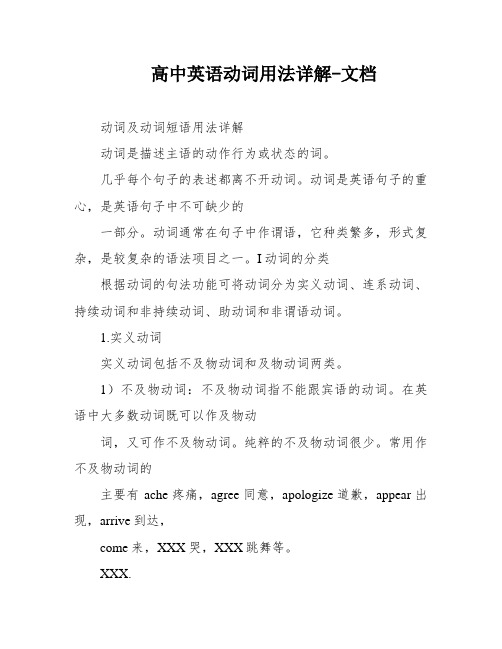
高中英语动词用法详解-文档动词及动词短语用法详解动词是描述主语的动作行为或状态的词。
几乎每个句子的表述都离不开动词。
动词是英语句子的重心,是英语句子中不可缺少的一部分。
动词通常在句子中作谓语,它种类繁多,形式复杂,是较复杂的语法项目之一。
I动词的分类根据动词的句法功能可将动词分为实义动词、连系动词、持续动词和非持续动词、助动词和非谓语动词。
1.实义动词实义动词包括不及物动词和及物动词两类。
1)不及物动词:不及物动词指不能跟宾语的动词。
在英语中大多数动词既可以作及物动词,又可作不及物动词。
纯粹的不及物动词很少。
常用作不及物动词的主要有ache疼痛,agree同意,apologize道歉,appear出现,arrive到达,come来,XXX哭,XXX跳舞等。
XXX.我们一直等到妈妈来。
2)及物动词:能跟宾语的动词称为及物动词。
英语中的动词大多数为及物动词。
(1)跟单宾语的及物动词只跟一个宾语的动词称为单宾语动词。
常见的单宾语动词主要有:accept接受,admire羡慕,admit承认,affect影响,afford买得起,announce公布,borrow借出,XXX埋等。
I'm sorry that I XXX.对不起我忘了你的电话号码。
(2)跟双宾语的及物动词可以同时跟两个宾语的及物动词叫双宾语动词。
双宾语中的一个宾语指人,称为间接宾语,一个宾语指物,称为间接宾语。
间接宾语普通位于直接宾语之前,也可位于其后,但此时在间接宾语的前面需加介词to或for。
直、间接宾语易位需加to的动词介词to侧重指动作的方向,表示朝着、向着、对着某人。
常见的此类动词有:tell通知,XXX借等。
Hand me that book, please.= Hand that book to me, please.请把那本书递给我。
直、间接宾语易位需加for的动词介词for侧重指动作的受益者,透露表现为或人、替或人。
初中英语:高频动词用法知识点归纳

初中英语:高频动词用法知识点归纳一、加to do的高频考查动词1. afford to do 负担的起做某事We can’t afford to make any mistakes.我们承担不起任何失误。
2. agree to do 同意做某事Do you agree to have dinner today?今天你同意一块吃饭吗?3. choose to do 选择做某事Why do so many choose to leave their country?为什么有这么多人要离开祖国?4. decide to do 决定做某事She decided to accept the offer. 她决定接受这一提议。
5. expect to do 期待做某事The shop expects to make more money this year. 这家店铺期望今年多赚点钱。
6. hope to do 希望做某事I hope to see you again sometime next year. 我希望明年某一时候再见到你。
7. hurry to do 急忙做某事We shall have to hurry to get there in time. 我们将不得不及时赶到那。
8. manage to do 设法做成某事How do you manage to do such a thing?你是怎么设法做这样的事?9. plan to do 打算做某事Where do you plan to spend your holiday?你打算去哪里度假?10. prefer to do 宁愿做某事I prefer to travel in the front of the car. 我宁愿坐在汽车的前面。
11. refuse to do 拒绝做某事I refuse to answer that question. 我不愿回答那个问题。
初中英语动词用法(全)[1].
![初中英语动词用法(全)[1].](https://img.taocdn.com/s3/m/96811447fc4ffe473268ab46.png)
初中英语动词用法Aact v. 表演,演戏act as sb./ sth. 充任某角色,担任某工作I don’t understand English, so you have to act as my interpreter(翻译。
其他用法:act for 代表某人,代理某人的职位During her illness, her lawyer has been acting for her in her business.在她生病期间,她的律师一直代理她的业务。
add v. (1加,增加,添加add sth. to sth. 往...里添加... eg. If the tea is too strong, add some water to it. eg. He added his signature to the petition(请愿书。
add A and B (together 加eg. If you add 5 and 5, you get 10.add to sth. 增加某事物eg. The bad weather only add to our difficulties.这种坏天气更增加了我们的困难。
(2 补充;继续说eg. “I’ll come here later.’’ he added.add in 包括...在内eg. Don’t forget add me in. 别忘了把我算上。
add up 合计,加起来add up to 总计达到add fuel to the fire 火上浇油afford v. 负担得起(...的费用,损失,后果,买得起;抽得出时间(常与can, could, be able to 连用afford sth. eg. I’d love to go on holiday but I can’t afford the time.eg. They walked because the can’t afford a taxi.afford to do sth. eg. They walked because they can’t afford to take a taxi.eg. I have to work hard because I can’t afford to loose my job.agree v. 同意,赞同agree with sb. 同意某人的意见eg. I agree with you.agree on + 表示具体协议的文件、计划、行动的词eg. We agreed on the plan. agree to do sth. 同意做某事eg. We agreed to start early.agree that + 宾语从句eg. She agreed that I was right.其他用法:agree with sb. (尤用于否定或疑问句 (对某人的健康或胃口适合I like mush rooms but unfortunately they don’t agree with me.我喜欢吃蘑菇,可惜吃了以后难受。
常见动词的用法(一)

常见动词的用法(一)常见动词的用法介绍在英语中,动词是句子的重要成分,用于表达动作、状态和存在等含义。
掌握常见动词的用法对于学习和使用英语来说至关重要。
本文将列举一些常见动词的用法,并对其进行详细讲解。
1. be(是/在)•用法一:用作连接动词,连接主语和表语(形容词、名词、副词等)。
–例句:I am happy.(我很快乐。
)•用法二:用于表达存在,表示某人或某物的存在。
–例句:There is a book on the table.(桌子上有本书。
)2. have(有/吃/持有)•用法一:用作实义动词,表示具有某种东西、从事某种行为或享受某种经验。
–例句:She has a car.(她有一辆车。
)•用法二:用作情态动词,表示“必须/应该”。
–例句:You have to finish your homework.(你必须完成你的作业。
)3. do(做)•用法一:用作实义动词,表示进行或完成某个动作。
–例句:What are you doing?(你在做什么?)•用法二:用作助动词,帮助构成疑问句和否定句。
–例句:Do you like ice cream?(你喜欢冰淇淋吗?)4. go(去/进行)•用法一:用作实义动词,表示移动到某个位置或进行某个活动。
–例句:We are going to the park.(我们要去公园。
)•用法二:用作情态动词,表示“可以/会”。
–例句:I can go swimming tomorrow.(明天我可以去游泳。
)5. make(制作/做/使)•用法一:用作实义动词,表示制作、做或创建某物。
–例句:She made a cake for her birthday.(她为自己的生日做了一个蛋糕。
)•用法二:用作情态动词,表示“强迫/使得”。
–例句:The teacher makes the students study hard.(老师让学生们努力学习。
高中英语关于高考高频动词及动词短语用法的总结

关于高考高频动词及动词短语用法的总结【考纲解读】1、重点动词所接成分的解读;2、重要短语的构成方法。
【知识点梳理】一、高考高频动词用法分类1. 常接不定式作宾语的动词:afford买得起;有能力做 agree同意 arrange安排ask 要求;让 beg请求 fail失败choose选择 decide决定 demand要求determine决定 expect期待 fear害怕hope希望 manage设法 offer提出plan计划 pretend假装 promise许诺refuse拒绝 want想要 wish希望He can't afford to buy a new computer.他买不起一台新电脑。
They managed to avoid an accident.他们设法避免了一起事故。
2. 常接动名词作宾语的动词:admit承认 advise建议 allow允许appreciate感激 avoid避免 consider考虑delay推迟 deny否认 enjoy喜爱escape逃避 finish完成 forbid禁止imagine想象 keep继续 mind介意miss错过 permit允许 practise练习risk冒险 stand忍受 suggest建议The twin brothers always enjoy going to the concert.这一对双胞胎弟兄对听音乐会总是兴致勃勃的。
You should practise speaking English as much as possible.你应该尽可能多地讲英语。
3. 常接不定式作宾补的动词:advise建议 allow允许 beg请求 cause导致encourage鼓励 expect期望 force强迫 get使;要intend打算 invite邀请 oblige迫使 order命令persuade说服 prefer宁愿 remind提醒 teach教want想要 warn警告The doctor advised me to take more exercise.医生建议我多锻炼。
高一高频动词及其时态运用总结

高一高频动词及其时态运用总结英语动词的时态运用是英语学习中的一个重要部分,尤其对于高中一年级的学生来说,掌握高频动词及其时态运用是建立英语语言基础的重要环节。
本文将总结高一阶段常用的高频动词及其时态运用,帮助同学们更好地理解和运用这些动词。
一、一般现在时态 (Simple Present Tense)一般现在时用于表示经常性的动作、习惯、真理、常规等。
1. 动词原形 (Base Form):表示一般现在时的谓语动词通常使用动词的原形。
例如:- I go to school by bus every day. (我每天坐公交车去学校。
)- He likes playing basketball. (他喜欢打篮球。
)- The sun rises in the east. (太阳从东方升起。
)2. 第三人称单数的变化:在第三人称单数主语前,谓语动词要加上-s或-es。
例如:- She finishes her homework before dinner. (她在晚饭前完成她的作业。
)- Tom often goes to the library. (汤姆经常去图书馆。
)二、一般过去时态 (Simple Past Tense)一般过去时用于表示过去发生或存在的动作、经历。
1. 动词过去式:表示一般过去时的谓语动词通常使用动词的过去式。
例如:- I played soccer with my friends yesterday. (昨天我和朋友们踢足球。
) - She walked to school this morning. (今天早上她走路去学校。
)- They visited their grandparents last week. (上周他们拜访了他们的祖父母。
)2. be动词的一般过去时变化:- I was at home yesterday. (昨天我在家。
)- He was in London last month. (上个月他在伦敦。
高考英语高频动词用法

高考英语高频动词:arrange用法1、英语可说 arrange to do sth :其意为“安排或准备做某事”。
如:They arranged to start early. 他们准备一早出发。
I’ve arranged to see her tonight. 我已安排今晚同他见面。
We still have to arrange how to go there. 我们还得安排如何去那儿。
2、英语不能说 arrange to do sth :可改用arrange for sb to do sth,其意为“安排某人做某事”。
如:He’s arranged for me to attend the meeting. 他已安排我去参加会议。
We have arranged for the car to come at nine. 我们已安排好让汽车9点钟来。
注:该结构有时可与后接从句的句型转换。
如:We arranged for the meeting to be put off for a week. / We arranged that the meeting be put off for a week. 我们安排把会议推迟一周后召开。
高考英语高频动词:appear用法1 . appear to do sth 似乎要……。
如:He appears to have a lot of money. 他似乎很有钱。
He appeared not to notice anything. 他似乎没看见什么。
注:有时不定式用进行式或完成式等。
如:It appears to be raining. 似乎在下雨。
You appear to have traveled a lot. 看来你去过不少地方。
2 . it appears that [as if ]… 似乎……。
如:It appears that [as if] he will win. 看来他会赢。
动词的用法知识点
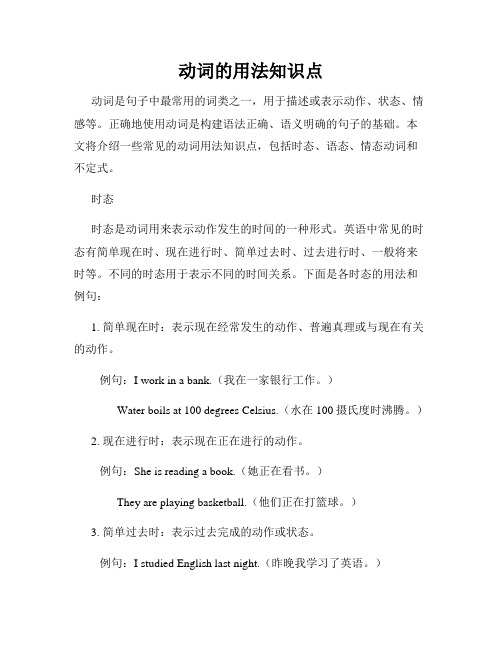
动词的用法知识点动词是句子中最常用的词类之一,用于描述或表示动作、状态、情感等。
正确地使用动词是构建语法正确、语义明确的句子的基础。
本文将介绍一些常见的动词用法知识点,包括时态、语态、情态动词和不定式。
时态时态是动词用来表示动作发生的时间的一种形式。
英语中常见的时态有简单现在时、现在进行时、简单过去时、过去进行时、一般将来时等。
不同的时态用于表示不同的时间关系。
下面是各时态的用法和例句:1. 简单现在时:表示现在经常发生的动作、普遍真理或与现在有关的动作。
例句:I work in a bank.(我在一家银行工作。
)Water boils at 100 degrees Celsius.(水在100摄氏度时沸腾。
)2. 现在进行时:表示现在正在进行的动作。
例句:She is reading a book.(她正在看书。
)They are playing basketball.(他们正在打篮球。
)3. 简单过去时:表示过去完成的动作或状态。
例句:I studied English last night.(昨晚我学习了英语。
)He lived in London for five years.(他在伦敦住了五年。
)4. 过去进行时:表示过去某一时间正在进行的动作。
例句:She was cooking dinner when I arrived.(我到达时她正在做晚饭。
)They were playing chess yesterday afternoon.(昨天下午他们在下棋。
)5. 一般将来时:表示将要发生的动作或存在的状态。
例句:We will go to the beach tomorrow.(我们明天去海滩。
) He is going to buy a new car next month.(他下个月打算买一辆新车。
)语态语态是动词表示主语在动作中所处的位置或动作的发出者。
英语中常见的语态有主动语态和被动语态。
常用动词的用法

常用动词的用法介绍常用动词的用法动词是句子中最关键的词类之一,用于描述人、物或事情的行为、状态和变化。
在英语中,常用动词的正确使用对于构建准确、流畅的句子至关重要。
本文将介绍一些常用动词的用法,并给出相应的例句,以帮助读者提高语言表达的准确性和流畅性。
1. Do(做,完成):- 用作实义动词时,表示执行特定的动作或任务。
例句:I do my homework every evening.(我每晚做作业。
) - 在疑问句或否定句中,用于表示一般动作的否定或疑问。
例句:Do you like ice cream?(你喜欢冰淇淋吗?)2. Have(有,拥有):- 表示某人/某物拥有或经历了某种状态或经历。
例句:She has a beautiful house.(她有一所漂亮的房子。
) - 表示完成某项动作或做过某种事情。
例句:I have visited Paris twice.(我去过巴黎两次。
)3. Be(是,存在):- 表示身份、状态或特征。
例句:I am a student.(我是一名学生。
)- 表示存在或位置。
例句:The book is on the table.(书在桌子上。
)4. Go(去,进行):- 表示移动到某个地方。
例句:I want to go to the park.(我想去公园。
)- 表示进行某种活动。
例句:She goes swimming every weekend.(她每个周末去游泳。
)5. Make(制作,做):- 表示创造、制造或完成某件事情。
例句:She makes delicious cakes.(她做出美味的蛋糕。
) - 表示强迫或引起某种情感或感觉。
例句:The movie makes me feel sad.(这部电影让我感到悲伤。
)6. Take(拿,带):- 表示获取、接受或拿走某物。
例句:Can you take this package for me?(你能帮我拿这个包裹吗?)- 表示进行某种行动或采取某种方式。
英语高频动词
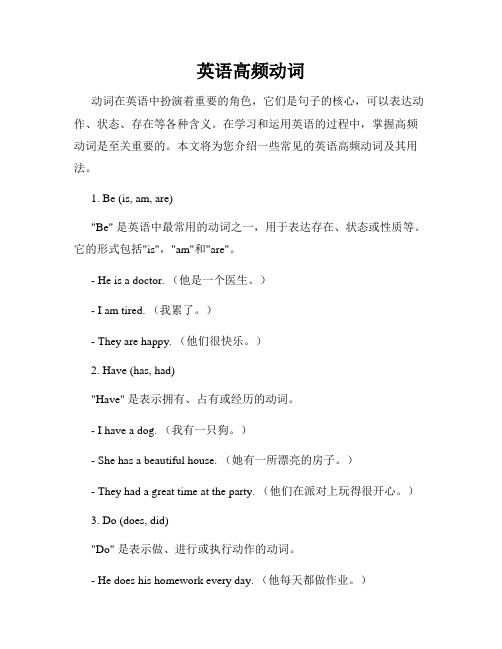
英语高频动词动词在英语中扮演着重要的角色,它们是句子的核心,可以表达动作、状态、存在等各种含义。
在学习和运用英语的过程中,掌握高频动词是至关重要的。
本文将为您介绍一些常见的英语高频动词及其用法。
1. Be (is, am, are)"Be" 是英语中最常用的动词之一,用于表达存在、状态或性质等。
它的形式包括"is","am"和"are"。
- He is a doctor. (他是一个医生。
)- I am tired. (我累了。
)- They are happy. (他们很快乐。
)2. Have (has, had)"Have" 是表示拥有、占有或经历的动词。
- I have a dog. (我有一只狗。
)- She has a beautiful house. (她有一所漂亮的房子。
)- They had a great time at the party. (他们在派对上玩得很开心。
)3. Do (does, did)"Do" 是表示做、进行或执行动作的动词。
- He does his homework every day. (他每天都做作业。
)- She did all the housework yesterday. (她昨天做了所有的家务。
)- We do exercise to keep fit. (我们锻炼身体保持健康。
)4. Make"Make" 表示创造、制作或引起的动作。
- They made a cake for the party. (他们为派对做了一个蛋糕。
)- He made a mistake in the test. (他在测试中犯了一个错误。
)- She makes me happy. (她让我快乐。
)5. Take"Take" 表示拿取、采取、花费时间或采取行动等。
高频动词固定搭配大全(一)
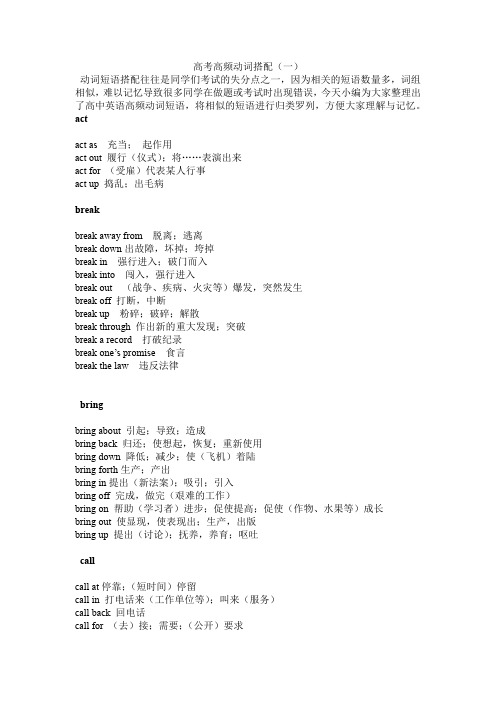
高考高频动词搭配(一)动词短语搭配往往是同学们考试的失分点之一,因为相关的短语数量多,词组相似,难以记忆导致很多同学在做题或考试时出现错误,今天小编为大家整理出了高中英语高频动词短语,将相似的短语进行归类罗列,方便大家理解与记忆。
actact as 充当;起作用act out 履行(仪式);将……表演出来act for (受雇)代表某人行事act up 捣乱;出毛病breakbreak away from 脱离;逃离break down出故障,坏掉;垮掉break in 强行进入;破门而入break into 闯入,强行进入break out (战争、疾病、火灾等)爆发,突然发生break off 打断,中断break up 粉碎;破碎;解散break through 作出新的重大发现;突破break a record 打破纪录break one’s promise 食言break the law 违反法律bringbring about 引起;导致;造成bring back 归还;使想起,恢复;重新使用bring down 降低;减少;使(飞机)着陆bring forth生产;产出bring in提出(新法案);吸引;引入bring off 完成,做完(艰难的工作)bring on 帮助(学习者)进步;促使提高;促使(作物、水果等)成长bring out 使显现,使表现出;生产,出版bring up 提出(讨论);抚养,养育;呕吐callcall at停靠;(短时间)停留call in 打电话来(工作单位等);叫来(服务)call back 回电话call for (去)接;需要;(公开)要求call on (upon) 请求;要求call out 召唤出动(尤指处理紧急情况);下令罢工call up 打电话给……;使回忆起;使想起carrycarry out 履行;实施;执行carry off赢得;获得;成功地对付carry on 继续做;坚持做carry through 帮助……渡过难关;成功完成;顺利实现comecome about 发生come across (偶然)遇见,碰见;发现come along 到达;跟随;进步come at 扑向;(用某方法)考虑;思考come back 回来,返回;再次成功come down 坍塌;降落;(价格、温度、比率等)下降come from 出生于,来自;始于,产自come in 参与;到达;参加讨论come on 登台,出场;改进,改善;开始come out出现;盛开,开花;出版;发行come to 合计;共计;达到(某状况;尤指坏的局面)come to an end 终止,结束come up 升起;即将发生(或出现、到来);被讨论come into being 发生,产生,出现,形成come into use 开始使用,获得应用come true 实现,成为现实cutcut down 砍倒;减少cut in 打断(谈话);插嘴cut off 中断(电话通话);打断(某人并阻止其讲话);切掉;割掉cut out 裁剪;删除;突然熄火cut up 切碎diedie away 逐渐减弱;逐渐消失die down 逐渐平息;逐渐变弱die out 灭绝;消失dobe done in 精疲力竭be done with 与(某人)断绝关系;做完(某事);用完(某物)do away with 废除;取消;结束do harm to 对……有害do one’s best 尽某人最大努力do one’s homework 做作业do sb proud做赢得赞誉的事do sb / sth justice 公平对待某人(或某事)do the cleaning 搞卫生do sb a favor 帮助某人do well in 擅长do without 没有……也行;没有……而设法对付过去do wonders (为某人或替某事)创造奇迹have nothing to do with 与……无关have something to do with 和……有关getget across 被传达;被理解;把……讲清楚get around 传播;流传;各处走动get ahead of 胜过;领先get along 离开;离去get along with 与……和睦相处get at 获悉;了解;查明get away 度假;休假get away (from) (得以)离开;脱身get back 返回,回去;寻回,找回get behind 落后;拖延;拖欠get down 咽下;写下;记录get down to 开始做某事;开始认真注意(或对待)某事get familiar with 熟悉get in 到达;被录取;被接受入学get off离开;出发;动身;(经允许)下班get on with进展;继续做某事get out of 逃避;摆脱(责任或义务)get over 解决;克服;控制get ready for 为……作准备get rid of 除去,去掉;免除,摆脱get through 正式通过;(用电话)接通,联系上;顺利通过(考试等)get together 召集;聚集;收集get up 站起;起来;起床get used to 习惯于givebe given to 经常做;习惯于give away 赠送;颁发;泄露give back 归还;送回give in 屈服;认输;投降give off 发出;放出(气味、热、光等)give out 用完,耗尽;停止运转;分发;公布give place to 让位于,被……所替代give rise to 使发生give up 投降;认输;放弃give way to 屈服;退让;让步gogo after 追求某人;谋求某事(或某物)go about 继续做某事;忙于某事;着手做某事go away 走开,离开;离家外出;消失go against 违反;与……不符go ahead 走在前面,先走;开始做;着手干go along 继续;进展;发展go around 流传;传播;参观go by 流逝;过去go for 适用于某人(或某事物);去取回go in for 参加考试(或竞赛);对某事物有兴趣,爱好go on 灯亮,通电;发生;继续说go off 离开(尤指去做某事);(电灯)熄灭go out 外出娱乐;(火或灯光)熄灭go over 审阅,检查go through经历;用完;耗尽go up(物价等)上涨,(温度)上升go wrong 犯错误;做错事;搞错go into 从事某职业;调查,研究handhand in交上;呈上hand in hand手拉手;密切关联hand out分发;提出;给予(建议、惩罚等)hand over移交holdhold back 拦阻,阻挡;隐瞒hold on (在困境或危险中)坚持住,挺住;(电话用语)别挂断;等一下hold out伸出手;维持;坚持hold up支持住;举起;阻碍;。
小升初单词归纳总结高频动词总结
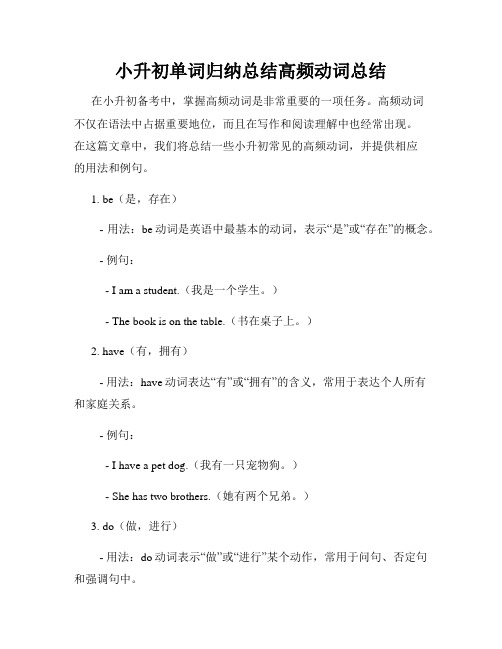
小升初单词归纳总结高频动词总结在小升初备考中,掌握高频动词是非常重要的一项任务。
高频动词不仅在语法中占据重要地位,而且在写作和阅读理解中也经常出现。
在这篇文章中,我们将总结一些小升初常见的高频动词,并提供相应的用法和例句。
1. be(是,存在)- 用法:be动词是英语中最基本的动词,表示“是”或“存在”的概念。
- 例句:- I am a student.(我是一个学生。
)- The book is on the table.(书在桌子上。
)2. have(有,拥有)- 用法:have动词表达“有”或“拥有”的含义,常用于表达个人所有和家庭关系。
- 例句:- I have a pet dog.(我有一只宠物狗。
)- She has two brothers.(她有两个兄弟。
)3. do(做,进行)- 用法:do动词表示“做”或“进行”某个动作,常用于问句、否定句和强调句中。
- 例句:- What do you do in your free time?(你空闲时间做什么?) - I don't do my homework.(我不做作业。
)- I do love ice cream!(我确实喜欢冰淇淋!)4. like(喜欢)- 用法:like动词表示“喜欢”某个人、物或活动。
- 例句:- I like playing basketball.(我喜欢打篮球。
)- She doesn't like broccoli.(她不喜欢西兰花。
)5. play(玩,演奏)- 用法:play动词表示“玩”某个游戏或“演奏”某个乐器。
- 例句:- They play soccer every weekend.(他们每个周末踢足球。
) - He can play the piano very well.(他弹钢琴很好。
)6. go(去)- 用法:go动词表示“去”某个地方。
- 例句:- We go to school by bus.(我们坐公共汽车去学校。
动词用法总结
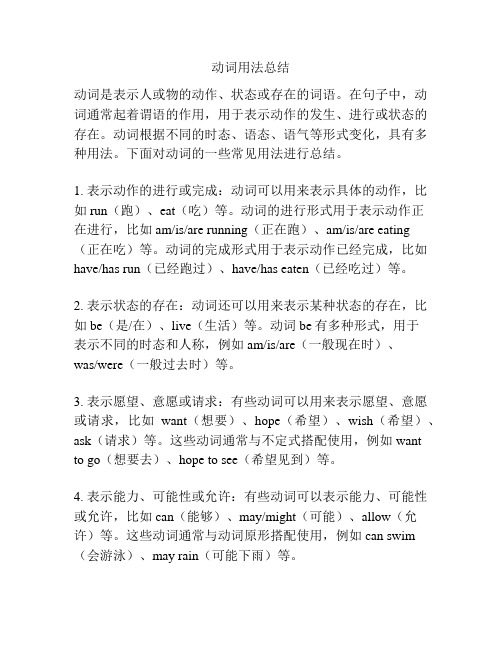
动词用法总结动词是表示人或物的动作、状态或存在的词语。
在句子中,动词通常起着谓语的作用,用于表示动作的发生、进行或状态的存在。
动词根据不同的时态、语态、语气等形式变化,具有多种用法。
下面对动词的一些常见用法进行总结。
1. 表示动作的进行或完成:动词可以用来表示具体的动作,比如run(跑)、eat(吃)等。
动词的进行形式用于表示动作正在进行,比如am/is/are running(正在跑)、am/is/are eating(正在吃)等。
动词的完成形式用于表示动作已经完成,比如have/has run(已经跑过)、have/has eaten(已经吃过)等。
2. 表示状态的存在:动词还可以用来表示某种状态的存在,比如be(是/在)、live(生活)等。
动词be有多种形式,用于表示不同的时态和人称,例如am/is/are(一般现在时)、was/were(一般过去时)等。
3. 表示愿望、意愿或请求:有些动词可以用来表示愿望、意愿或请求,比如want(想要)、hope(希望)、wish(希望)、ask(请求)等。
这些动词通常与不定式搭配使用,例如wantto go(想要去)、hope to see(希望见到)等。
4. 表示能力、可能性或允许:有些动词可以表示能力、可能性或允许,比如can(能够)、may/might(可能)、allow(允许)等。
这些动词通常与动词原形搭配使用,例如can swim (会游泳)、may rain(可能下雨)等。
5. 表示习惯、例行或经验:有些动词可以表示习惯、例行或经验,比如usually(通常)、often(经常)、always(总是)等。
这些动词通常与一般现在时连用,表示经常或反复发生的动作,例如I usually go to the gym in the morning(我通常早上去健身房)。
6. 表示想象、虚拟或条件:有些动词可以表示想象、虚拟或条件,比如imagine(想象)、suppose(假设)、if(如果)等。
中招高频动词短语及用法精选

中考高频动词短语及用法精选1. allow/ advise doing 允许/ 建议做某事allow /advise sb to do sth 允许/ 建议某人去做某事(带宾语时后接不定式)My father allowed me to go out for a walk after finishing my homework.Be allowed/ advise to do 被允许/被建议做某事(被动语态后用不定式)2. asked sb (not) to do sth 叫某人做事某事(叫某人不要去做某事)My father asked me to study hard. He asked me not to swim alone.be asked (not) to do sth 被叫去做某事/被邀请去做某事I was asked (not) to have a dinner with them yesterday.3. be afraid to do sth 害怕做某事She is afraid to ask me questions.be afaid of doing sth 害怕做某事I am afraid of going out at night.be afaid of sth 害怕某物He is afraid of snakes.4. be amazed to do sth 对做某事感到惊讶He was amazed to meet the girl there.be amazed at sth 对某事感到惊讶They were amazed at the news.5. be busy doing/with sth 忙于做某事(常考)I was busy washing my car at that time. 那时候我正忙于清洗我的车子。
I am busy with my work.6. be coming/going/leaving/dying(点动词用进行时态时表将来)The bus is coming / the dog is dying.7. be excited to do sth 对做……感到兴奋Jacky was excited to travel there by plane.be excited about doing sth 对做……感到兴奋He was excited about passing the exam without going overing books.be excited at sth 对某事感到兴奋Lily was excited at his words.8. be frightened to do sth 害怕去做某事Sam is frightened to ride a horse.9. be glad/happy to do sth 高兴去做某事she is happy to clean the blackboard with me.be pleased to do sth高兴做某事She was pleased to help the old man yesterday. be pleased with sth 对某事感到高兴/满意The teacher was pleased with my answer.10. be interested in sth/doing sth 对某事感兴趣/ 对做某事感兴趣she is interested in swimming in the river. My btother is interested in Chinese.13. be/get ready /prepared for sth /to do sth prepare to do sthBe ready for sth 为某事做好了准备We are ready for the exam.Be ready to do sth 为做某事做好了准备We are ready to have a birthday party for her.get ready for sth为某事在做准备We are getting ready for the exam.get ready for doing sth 为做某事而做准备11. be sorry to do sth 对做某事感到抱歉12. be sure to do 肯定会做;一定会做He is sure to win.Be sure that + 句子13. be surprised to do sth 对做某事感到惊奇be surprised at sth 对某事感到惊奇14. be supposed to do 应该做某事You are supposed to shake hands.15. be willing to do 乐意做某事They are willing to work hard to achieve their dreams.16. begin /start to do sthbegin/start doing sth17. can / be able to afford to do sth 有能力(可以,能够,得起)18. can/may/must do sth could/would/should/might do sth19. can’t wait to do sth 等不及要去做某事20. decide to do sth 决定去做某事make up one’s mind to do sth 下决心去做某事(常考)make a decision to do sth 对做某事作出决定21. deserve to do sth 值得/应该做……22. encourage sb to do sth 鼓励某人去做某事23. enjoy doing sth 乐意去做某事24. expect (sb) to do sth 期望去做某事25. fail to do sth 没能做成某事He failed to catch the bus.be able to do sth / succeed doing sth 成功做了某事26. finish doing sth 做完某事(后接动词-ing形式)27. get sb to do sth 让某人做某事(一般动词后宾补用不定式)make /let/ have /sb do sth 让某人做某事(使役动词后宾补用动原)28. get/have a chance to do sth 得到一个做某事的机会29. give /pass /show /lend / sell sb sth / sth to sbbuy/get/bring sb sth/sth for sb30. go on to do sth 继续做(另一件)事go on doing sth 继续做(同一件)事31. hate to do/doing sth 讨厌/不喜欢做某事32. have fun / a good time doing sth 做某事有意思…33. have problems / trouble / difficulties doing sth 做某事遇到困难34. have to do sth 必须、不得不做某事have sth to do 有事要做35. hear sb do sth 听到某人做某事(后接动词原形,非正在做,前后做或经常做)hear sb doing sth 听到某人正在做某事(正在做)36. help to do sth help with sth. 帮忙做某事help sb (to) do sth help sb. with sth. 帮助某人做某事37. hope/wish to do sth 希望做某事wish sb to do sth 希望某人做某事38. I t seems that 好像是……(后接从句)Sb. / Sth.seem todo sth seem (to be)+adj.39. It’s + adj+(for sb) to do sth . (对某人来说)做某事(怎么样)It’s+adj +(of sb) to do sth e.g: It’s nice of you to tell me the news.40. It takes sb some time to do sth . 花费某人多长时间做某事41. pay/ paid for sth…sth costs/ cost some moneysb spends/spent some money/ time…on sth./ doing sth…..it takes/ took sb some time …to do sth42. It’s best for sb to do sth. 对某人来说做某事是最好的had better do sth /had better not do sth最好做某事/ 最好不做某事43. It’s time for sb to do sth 是某人做某事的时候了44. keep (on)doing sth 坚持/ 不停做某事keep sb doing sth 让某人做某事keep sb from doing sth 阻止某人做某事keep sb/sth +adjhave kept the book for 2 days 借这本书两天(不要用borrow或lend)45. learn to do sth 学会了做某事learn sth from sb 向某人学习46. like to do/doing sth 喜欢做某事would like sb to do sth 想要某人做某事47. need to do sth 需要做某事sth need doing(主动语态表被动含义)= sth to be done (被动语态)某事需要被做needn’t do / don’t have to do 不必做…48. prefer to do sth rather than do sth 宁愿……而不愿……prefer sth. to sth. 喜欢…不喜欢… =like sth be tter than…prefer doing sth to doing sth 喜欢做……不喜欢做……I prefer reading books to going shopping.我喜欢读书,不想喜欢购物。
高频词法(五)——动词时态语态(1)

年级高二 学 科 英语 编稿老师 李敏英课程标题高频词法(五)——动词时态语态(1)一校黄楠 二校 林卉 审核 陈倍香英语动词的时态共有十六种,最常见的有:一般现在时、一般过去时、一般将来时、过去将来时、现在进行时、过去进行时、现在完成时、过去完成时、现在完成进行时、过去完成进行时十种。
高考对时态的考查侧重以下几个方面:1. 一般现在时、现在进行时、现在完成时的区别;2. 现在完成时、完成进行时的区别;3. 一般过去时、过去完成时、现在完成时的区别;4. 几种将来时的区别;5. 固定句式中的时态问题。
时态是历年高考考查的热点,常见于单项选择、短文改错题,英语写作中。
能够正确运用时态是学生必须具备的基本功。
一、知识精讲1. 动词时态形式比较 (以study 为例)一般时 进行时完成时 完成进行时 现在studystudiesam studyingis studying are studyinghave studied has studied have been studying has been studying 过去 studiedwas studyingwere studyinghad studied had been studying 将来shall studywill study shall be studying will be studying shall have studied will have studied shall have been studying will have been studying过去 将来 should study would study should be studying would be studying should have studied would have studied should have been studying would have been studying2. 动词时态的用法1)一般现在时①表示客观真理、普遍公理、科学事实、不受时间限制的动作。
高中英语动词用法详解

高中英语动词用法详解1 动词原形及不定式的用法I动词原形的用法:1.除单三人称的一般现在时,其它人称作主语,动词用原形。
2.将来时态shall, will, should, would之后用动词原形。
3.祈使句句子开头用动词原形。
4.助动词do, does, did之后用动词原形。
5.情态动词can、could、may, might, have/has to, must, need, dare ,ought to之后用动词原形。
6.使役动词let、make、have 之后用动词原形。
7.感官动词see、watch、notice、hear、feel、find之后用动词原形(说明动作已经结束)。
8.had better 之后用动词原形。
9.why / why not 之后用动词原形。
10.would rather do sth . than do sth .11.prefer to do sth. rather than do sth./ prefer doing sth. to doing sth.help sb. do sth.II.动名词的用法:介词之后动词要用动名词形式(动词+ing)部分动词之后的动词只能用动名词形式:enjoy, finish, practice, mind, spend, dislike, find , keep部分短语后省略了介词in: have fun/ problems/ difficulties/ trouble /a good time doing be busy doing ,be worth doing , can’t help doing , feel like doing , do some doing sth.下面这些动词既可跟动名词又可跟不定式:like / love / hate doing (doing表示习惯)(to do表示具体的动作)stop doing(表示停止)(doing表示开始做不定式的动作);remember , forget (不定式表示未做;动名词表示已做);try (doing表示试着做;to do表示努力做);go on (doing继续做相同的事to do继续做不同的事)begin , start (to do与doing区别不大);need (人作主语用to do ;物作主语用doing表示被动);mean(人作主语用to do表示“打算做”;事/ 物作主语用doing表示“意味着”);这些动词既可跟动词原形,又可跟ing形式:see,watch,hear.notice (用原形是指动作结束,ing表示动作正在进行)go swimming/cleaning/fishing/skating/skiing….No parking/swimming/spitting…..do some cleaning/washing/reading…III.动词不定式的用法:1.ask/tell/want/order/teach/wish/would like/invite/encourage sb. to do sth.2.ask/tell/want/order/teach/wish/would like/invite/encourage sb. not to do sth.3.Help...(to) do sth.4、主系表+ 不定式(to do)5.主系表+for sb + 不定式(to do)6.部分动词既可跟动名词又可跟不定式:(同动名词6)7.疑问词+不定式(to do)可以把复合句变为简单句,(to = 主语+will/would/can)IV.动词单三(动词+s / es)用于第三人称单数作主语的一般现在时态。
- 1、下载文档前请自行甄别文档内容的完整性,平台不提供额外的编辑、内容补充、找答案等附加服务。
- 2、"仅部分预览"的文档,不可在线预览部分如存在完整性等问题,可反馈申请退款(可完整预览的文档不适用该条件!)。
- 3、如文档侵犯您的权益,请联系客服反馈,我们会尽快为您处理(人工客服工作时间:9:00-18:30)。
常用动词用法1. serve1) (vt. & vi).(为…)服务,(为…)服役,任(职),供职serve the people为人民服务。
serve in the army在军队服役。
He once served under the king他曾经在那个国王的手下供职。
2) (vt. & vi).侍/伺候,接待,为……端上The waiters serverd the customers with red wine. 侍者为客人上红酒。
serve tea after dinner. 饭后上茶。
Lunch will be served at 12:00. 12点开饭。
The housemaid served at the table. 女仆在桌边伺候。
The manager of the restaurant has trained the waitress to serve correctly at table.饭馆的经理训练过那位女服务员如何正确地招待顾客。
3) (vt. & vi)(对……)有用,符合,适合,满足,用作The tool serves many purposes.这个工具有多种用途。
Is this enough space to serve your needs?这个空间够你用吗?Serve as a model 作为榜样That big box may serve as a table.那只大箱子可作桌子用。
The meeting will serve to develop bilateral relations between two countries.这次会议将有助于发展两国的双边关系。
4) (vt.) 向…供应, 提供,The river has served the village with water for hundreds of years.那条河为该村庄供水已达数十年。
The company will serve a meal at noon to all staff workers.该公司将为所有职员提供午餐。
The restaurant serves nice food.这家饭馆供应的饭菜不错。
5) (vt.) 度过(某段时间)She served two years in prison for theft. 她因偷窃服了两年刑。
Serve one’s apprenticeship.做学徒。
6) (vt. & vi) (发)球It’s my turn to serve. 轮到我发球了。
2. work(vt. & vi).1)(使)工作, (使)劳动,(使)干活,做He's been working hard all day. 他辛劳地工作了一天。
She works as a bus driver. 她的职业是公共汽车司机。
Mary works for a publishing company. 玛丽在一家出版社任职。
work at a new invention 从事一项新的发明work one's way through college 靠做工读完大学2)(使)运转/行, 使)操作All the telephones don't work properly today. 今天所有电话机都出故障了。
Do you know how to work this machine?work a farm 经营农场3)起作用,有成效Does anti-wrinkle creamsreally work?抗皱霜真的有用吗?If the scheme works in practice, most of the farmers in this area will be rich.如果计划在实践中成功, 这地区的大部分农民将富起来。
4)造成,产生The sea works high. 海浪汹涌起伏。
work an abacus 打算盘work wonders 创造奇迹work a sweater 织毛衣5)固定词组work at/on 从事于,致力于;努力做work off 消除,去除work out 解决;算出;弄懂,理解;想出,制定出work up 激发,激起;制订出,精心做出3. grow (grew,grown)1)(vt.)种植plantTo plant, grow, or yield a crop. 种植谷物,生长谷物,生产谷物This farm grows mainly flowers and vegetables. 这个农场主要种植蔬菜和花卉。
The farmer has grown the seed a big tree. 这个农民种下的种子长成了大树。
They mainly grow wheat, corn, barley and oats. 他们主要种植小麦、玉米、大麦和燕麦。
In this flat country,people grow rice and raise cattle在这土地平坦的乡间,人们种植水稻,饲养牲畜。
2) (vi.) 生长, 发育developPlants grow naturally. 植物自然地生长。
Babies grow very quickly. 婴儿长得很快。
The crops are growing well. 庄稼长得很好。
3)(vi. & link v.)渐渐变得get,become,turnThe company has grown rapidly in the last five years. 这家公司近五年来迅速发展壮大。
She's growing to like him better. 她渐渐地更喜欢他了。
You've changed a lot.You have grown big boy. 你变了许多, 已经长成大小伙子了。
The dispute grow warm. 争论变得热烈起来。
The path grew more obscure in the fading light. 小径在渐渐消失的光线下变得更暗了。
You will grow wiser,as you grow older 随着你年令的增长, 你会变得更聪明。
In autumn leaves of trees grow yellow. 树叶在秋天渐渐变黄。
4. pay1) (vt. & vi.) 付给; 付款This job pays well. 这份工作报酬不错。
They had to pay rather heavily. 他们得付出沉重的代价。
I have paid the milkman this month. 我这个月付款给送奶人了。
He ought to pay the rent. 他应该付房租。
We refused to pay them their wages. 我们拒绝付给他们工资。
Do you pay interest on that account? 那种存款付给利息吗?2) (vt. & vi.) 有利可图; (对…)有利, (对…)值得Crime doesn't pay. 犯罪得不偿失。
It pays to advertise. 登广告很有用。
It will pay him to listen 听…对他有利Telling lies does not pay. 撒谎不值得。
Wisdom is a good purchase though we pay dear for it. 为了求知识,代价虽高也值得。
It will pay to read a dictionary if you have time. 如果你有时间,翻翻词典是值得的。
Can you make it pay to take such pains to do this job? 你这么费心做这事,值得吗?Tom searched for gold many years before he found pay dirt.汤姆寻金多年才找到值得开采的含金矿土。
It will pay in the long run if the setting off of firecrackers is effectively banned in the cities.从长远来看,在城市里真正有效地禁放鞭炮,是值得的。
3) (vt.) 给予The manager paid her a compliment on her work. 经理赞扬了她的工作。
To pay honor to. 给予巨大荣誉To give maximum (very close) attention to给予极大的注意If the investment is very big, we pay the biggest preference according to the actual circs.投资规模较大的,按一事一议的原则给予最大优惠。
The Employer should pay appropriate post allowance to the laborers engaged in the occupational-disease-inductive operation.用人单位对从事接触职业病危害的作业的劳动者,应当给予适当岗位津贴。
4) (n.)工资His pay goes up every year. 他的工资每年都有增加。
The trade unions bargained away their rights in exchange for a small pay rise.工会不惜牺牲自己的权利以换取微薄的加薪。
I get a good pay. 我的工资很高。
They are striking for higher pay . 他们罢工要求增加工资。
The staff want a pay rise. 全体职员希望增加工资。
5.deliver1) (vt. & vi.) 递送, 交付; 送货; 传送, 运载, 运输The telegram was delivered early this morning.这份电报是今天清晨送到的。
The postman delivers letters.邮递员投递信件。
He delivered them the goods.他给他们送来了一些货物。
2) (vt.) 发言; 发表;宣布;发布Mr. Smith delivered the opening speech.史密斯先生致开幕词。
